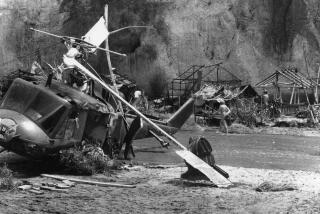The Forgotten Man
- Share via
FOR MOST OF the summer, the picture competing with John Landis’ “Coming to America” for top spot in the box-office derby has been “Who Framed Roger Rabbit,” the ingenious mixture of live action and animation that follows the adventures of a lovable hare who goes into hiding to avoid being questioned about a homicide.
The co-producer of “Roger Rabbit,” Frank Marshall, seemed to perform a vanishing act of his own when authorities were investigating the deaths on the “Twilight Zone” set. Marshall, executive producer of “Twilight Zone--The Movie” and partner of co-producer Steven Spielberg, was one major player in the “Twilight Zone” case who managed to avoid all questioning about the accident.
Casting director Marci Liroff testified at the criminal trial that she informed Marshall of Landis’ intention to hire young children to work illegally after hours. Landis testified that Marshall not only knew about the illegality of the casting but offered to help recruit youngsters for the scene. Marshall signed the check for petty cash that was used to pay the parents of the two children. He was also present on the set when the children were working and was a material witness to the accident.
Although virtually every other important witness was questioned by Sheriff’s Department investigators, the National Transportation Safety Board, Cal / OSHA or the district attorney’s office, Marshall was never interviewed by any of these agencies.
Sheriff’s investigator Thomas Budds tried several times to reach Marshall at his offices at both Universal and Warner Bros., but on every occasion Budds was told that Marshall was not in. “When you’re a bigwig at a studio,” Budds says, “it’s very easy to control who gets in and out.” Eventually, Budds tried staking out Marshall’s home, but the producer was out of town. Three months before the start of the trial, the district attorney took the unusual step of sending Budds to London to serve Marshall with an international subpoena that would compel him to testify. Marshall was there at the time working on “Who Framed Roger Rabbit.”
According to Budds, Marshall refused to see the representative from the U.S. Embassy who went to the St. James Club to serve him with the subpoena June 26, 1986; but the producer did say he would be available later that afternoon. When the embassy official returned, Marshall was gone.
With the help of Scotland Yard, Budds learned that immediately after the first visit of the embassy official, Marshall had checked out of the St. James Club and left London on a private jet belonging to Steven Spielberg’s Amblin Entertainment, en route for Paris.
“I didn’t know where he was located in Paris,” Budds says, “or I would have followed him there.” Asked whether Marshall’s seemingly evasive actions were illegal, Budds makes it clear that they were not. “But it certainly is less than meeting your civic responsibility,” Budds says.
Defense attorneys charged that the district attorney’s office had not made a concerted effort to find Marshall before that trip to London. Chief Deputy Dist. Atty. Gilbert Garcetti denies these charges. “We did make every effort possible to subpoena Frank Marshall,” Garcetti says, “but he was able to get out of our hands.” Garcetti adds that with adequate funds and transportation, “it’s not hard to avoid us.”
Marshall’s attorney, Richard Rosen, has insisted that his client was not evading the police. “Frank isn’t running from anybody,” Rosen said. “He’s busy working out of town. If the police want to find somebody, they usually do.”
The fact remains that Frank Marshall never answered a single question about his knowledge of the “Twilight Zone” case--either about the hiring of the children or about what he observed on the set before and after the helicopter crash.
At this point, the evidence that he knew of the conspiracy to hire the children illegally is uncontested.
Marshall’s office was contacted in connection with this article, but he declined to comment. His assistant said that Marshall was out of the country.
More to Read
Only good movies
Get the Indie Focus newsletter, Mark Olsen's weekly guide to the world of cinema.
You may occasionally receive promotional content from the Los Angeles Times.







